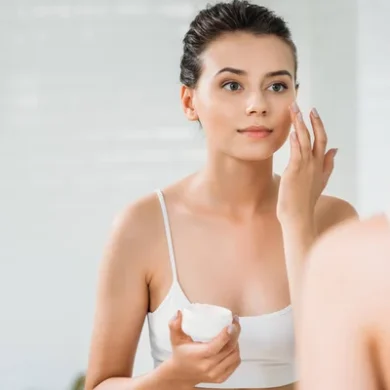SAN FRANCISCO – For most women, “putting on their face” (a.k.a. applying cosmetics) is an important step in their morning routine. However, for those with sensitive skin, this beauty transformation can prove to be tricky as they do their best to avoid cosmetic irritation and unsightly breakouts. While some of these women feel the need to steer clear of make-up altogether, the solution to protecting their sensitive side could lie in following some simple cosmetic suggestions and reminders.
Speaking today at the American Academy of Dermatology’s 2003 Annual Meeting in San Francisco, dermatologist Zoe Diana Draelos, MD, Clinical Associate Professor of Dermatology, Wake Forest University School of Medicine, Winston-Salem, NC, discussed dermatologists’ best cosmetic bets for keeping sensitive skin looking and feeling its best.
“Understanding the make-up of cosmetics can really pay off when it comes to protecting sensitive skin,” said Dr. Draelos. “Women should know what type of ingredients to look for when they’re purchasing products at beauty counters or drugstores, as well as know how to properly use those cosmetics once they bring them home.”
To determine which cosmetic products are best for sensitive skin, Dr. Draelos offers the following recommendations:
1. Choose powder when possible.
Powder cosmetics are not only great at removing shine, they have very few preservatives and contain minimal ingredients that can cause skin irritation. This means powder cosmetics are much less likely to cause problems for women with sensitive skin than their liquid counterparts.
2. Avoid waterproof cosmetics.
While waterproof cosmetics, such as mascara, are great for tearful moments, they require a solvent to remove them that also removes sebum, the oily substance made by the sebaceous glands in the skin. Without this oily barrier, skin is exposed to potential irritants that can cause a beauty breakout.
3. Throw out old cosmetics.
“Women should keep track of cosmetic expiration dates and throw out any items that have passed their peak,” cautioned Dr. Draelos. “Old make-up products may have spoiled or become contaminated, a particularly important point when it comes to eye products.” A few standard product life spans include: one year for foundation and lipstick; three-to-four months for mascara; and two years for
powder and shadows. It is also important to wash make-up brushes and sponges regularly since they can harbor dirt and germs that will aggravate sensitive skin.
4. Use black-colored eyeliner and mascara products.
Women with sensitive skin will find that dramatic black is best when it comes to eyeliner and mascara product colors. Dermatologists feel that black is the least allergenic of all colorants.
5. Use pencil eyeliner and eyebrow fillers.
According to Dr. Draelos, “Pencil eyeliner and eyebrow pencils are wax-based and contain pigment and minimal preservatives. They are much less likely to cause problems than liquid eyeliners that contain latex and may cause problems in latex-sensitive individuals.” The pencil forms of these cosmetics are also water removable, making them easier on the surface of the skin.
6. Stick to earth-toned eye shadows.
Lighter earth tones, such as tan, cream, white or beige, seem to cause less upper-eyelid irritation in women with sensitive or itchy eyes. “It is possible that the higher concentration of pigments in darker colors like navy blue can cause an adverse reaction in women with sensitive skin,” speculated Dr. Draelos.
7. Check sunscreen ingredients.
Dermatologists recommend daily use of a broad-spectrum sunscreen with a Sun Protection Factor (SPF) 15 or higher. For women with sensitive skin, this sunscreen should only contain the physical sunscreen ingredients zinc oxide or titanium dioxide. Unlike chemical sunscreen agents which absorb UV rays, it is impossible to be allergic to physical sunscreen ingredients since they deflect the rays rather than absorb them.
8. Use products that contain no more than 10 ingredients.
Simply stated, the fewer ingredients in a product, the less likely it is that the product will cause a problem.
9. Avoid nail polishes.
In addition to being easily smudged and chipped, wet nail polish can be transferred to a person’s eyes and face before it dries. This casual transfer can cause problems for women with sensitive skin if they find the polish irritating or have an allergic reaction to any of the components of the polish.
10. Use foundations based on silicone.
While powder is preferred to protect sensitive skin, women choosing a liquid foundation should look for one with a silicone base. Liquid facial foundations based on silicone do not cause acne, and silicone has a very low incidence of skin irritation.
According to Dr. Draelos, “Beauty products are a great way to enhance a woman’s appearance, but if you have sensitive skin and are finding that cosmetics do more harm than good, your best course of action is to consult with a dermatologist who can help determine the right beauty regimen for you.”
The American Academy of Dermatology, founded in 1938, is the largest, most influential, and most representative of all dermatologic associations. With a membership of over 14,000 dermatologists worldwide, the Academy is committed to: advancing the diagnosis and medical, surgical, and cosmetic treatment of the skin, hair and nails; advocating high standards in clinical practice, education, and research in dermatology; supporting and enhancing patient care for a lifetime of healthier skin.















